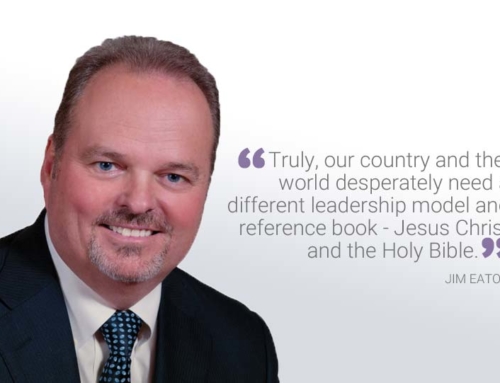When we think about using our businesses as a means to further God’s purposes and to extend His kingdom, we are often drawn toward conventional Christian expressions or techniques. We are all aware of companies that have used obvious ways of proclaiming a Christian message and focus. Anything from putting Bible verses on drink cups to copies of New Testaments in their packaging or closing for business on Sundays. These are all great things, and done in the right spirit they can have an impact, but we believe there is a more subtle and organic way to use your business to extend God’s kingdom. We use the term organic purposefully.
What we’re suggesting is that you view your company or organization not as a distribution center for Christian messages, but as a terrain or environment that can grow and disciple people, providing an easy entry point into God’s kingdom, taking the mindset of a farmer rather than a hunter and cultivating a life-giving terrain or culture in your business. Even a farmer will go hunting once and while, but their primary work is to nurture and cultivate an environment that grows good things.
Jesus used so many parables in an agricultural context or that embodied the idea of nurturing or growing the Kingdom. Even the prayer Jesus taught us to pray carries this same message. Jesus said when you pray do it like this, pray that “God’s Kingdom would come, and his will would be done on earth as it is in Heaven” – your business can be part of answering that prayer!
There are so many facets to this conversation, but let’s focus on the idea of developing a life-giving culture in your business or organization. Everyone who works for your organization is hopefully getting a fiscal paycheck, that’s a given. What is less sure is whether your employees are getting an emotional paycheck as that is a variable.
Life Giving or Life Taking?
Does your company culture and environment give life or take life from your employees? In John 10:10, Jesus tells us that he came to give us an abundant life. I don’t think he meant just the weekend or the hours after we leave the office. As Christ followers, not only should we have abundant lives, but as the primary leaders of our businesses we should be creating life-giving cultures for those we employ, supervise and serve.
Canadian business consultant Brady Wilson, Co-Founder at Juice Inc., has identified five basic needs that every person requires to be fulfilled emotionally, particularly in an employment environment. He likens these needs to oxygen for the soul. When the oxygen is cut off, people will begin to suffocate and the result is that they act out in desperation like a person starved for air. If you have ever struggled to breathe, you know the feeling.
Here are the five basic needs Brady identifies:
- Belonging (need to fit) – Relationship, Inclusion, Acceptance, Team is Key
- Security (clarity) – Order, Efficiency, Rules, Predictability
- Freedom (supported) – Spontaneity, Flexibility, Adventure/Risk, Autonomy/Independence
- Significance (valued) – Achievement, Legacy, Status, Productivity
- Meaning (inspiration) – Need to Understand Why, Justice, Strong Ideology, Inner Witness
The fact is, that if the emotional paycheck is not being paid, your company culture may be bankrupt, and eventually the fiscal paycheck won’t be enough to keep your staff and leaders engaged. The cost of a bankrupt company culture is high. Lost productivity and reduced employee retention rates are just a few of the outcomes of a bankrupt company culture. It doesn’t take much imagination to understand the fiscal implications of these two symptoms alone.
But if we look at this from a higher altitude, a life-giving culture is not only good business. A life-giving culture honors God, and demonstrates and validates for our staff and ultimately our customers that our company or organization really is an expression of God’s Kingdom. It provides a fertile environment for the Holy Spirit to do the work that only the Spirit can do. If you are intrigued by this idea, take time to read the Gospels again through a new lens. Take time to study Jesus as a Cultural Architect. Take time to notice how Jesus challenges mindsets that were contrary to the ethos of God’s Kingdom Worldview. Notice how he interacts with the crowd, with his leadership team and one on one. Jesus cultivated an environment that, once empowered by the Holy Spirit, has changed the world!
A thought to ponder…
I (Bruce) grew up with the classic understanding that when I engaged with an individual in a pre-Christian state it was called evangelism, and once they had accepted Jesus they were ready to be discipled. I have come to realize that people can be discipled into God’s Kingdom. We don’t have to wait until after they have entered to begin to disciple. The workplace can be one of the most potent environments to demonstrate a life-giving culture and we don’t even need to attach a chapter and verse to it. This was a powerful paradigm shift for me.
Let’s end with a quote from my friend Paul Gibbs, who has written one of the best books I have read on discipleship, Talmidim:
The Greeks worked to shape an individual who would know truth. Jesus worked to shape a community that would demonstrate truth. Modern preaching aims to create individual Christians and educate them about God’s Glory. God’s son aimed to create a community that displayed God’s glory.
— Paul Gibbs
Take time to ask ourselves these tough question on a regular basis:
- Is the abundant life that Jesus promised evident on my life, relationships and company?
- Are the valuable people I lead having their emotional paycheck paid on a regular basis?
- Am I being intentional about creating a life-giving culture in my business or organization?
- Do I see my company or organizational culture as a powerful vehicle for extending God’s influence and Kingdom? Does it demonstrate truth and display God’s glory?




